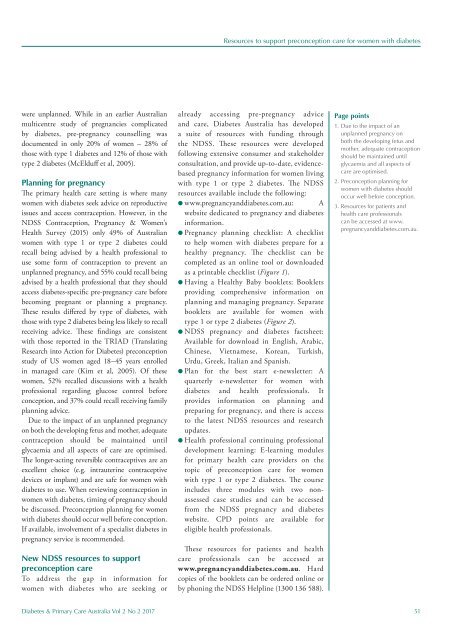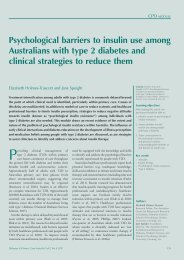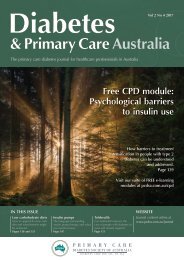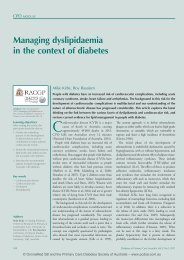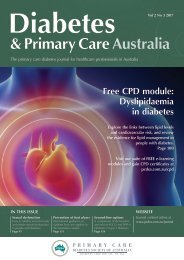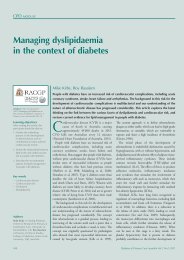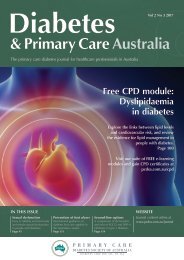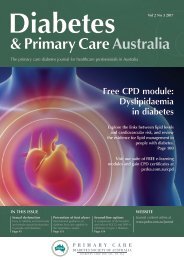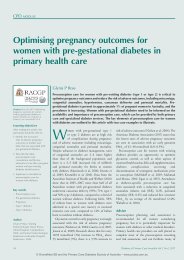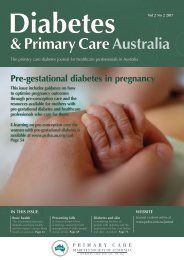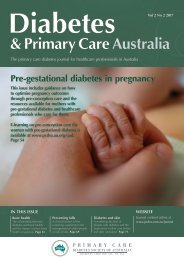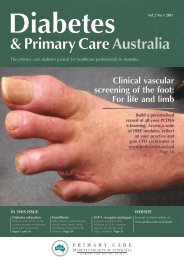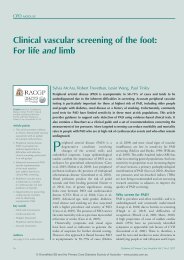DPCA2-2_issue_v3
You also want an ePaper? Increase the reach of your titles
YUMPU automatically turns print PDFs into web optimized ePapers that Google loves.
Resources to support preconception care for women with diabetes<br />
were unplanned. While in an earlier Australian<br />
multicentre study of pregnancies complicated<br />
by diabetes, pre-pregnancy counselling was<br />
documented in only 20% of women – 28% of<br />
those with type 1 diabetes and 12% of those with<br />
type 2 diabetes (McElduff et al, 2005).<br />
Planning for pregnancy<br />
The primary health care setting is where many<br />
women with diabetes seek advice on reproductive<br />
<strong>issue</strong>s and access contraception. However, in the<br />
NDSS Contraception, Pregnancy & Women’s<br />
Health Survey (2015) only 49% of Australian<br />
women with type 1 or type 2 diabetes could<br />
recall being advised by a health professional to<br />
use some form of contraception to prevent an<br />
unplanned pregnancy, and 55% could recall being<br />
advised by a health professional that they should<br />
access diabetes-specific pre-pregnancy care before<br />
becoming pregnant or planning a pregnancy.<br />
These results differed by type of diabetes, with<br />
those with type 2 diabetes being less likely to recall<br />
receiving advice. These findings are consistent<br />
with those reported in the TRIAD (Translating<br />
Research into Action for Diabetes) preconception<br />
study of US women aged 18–45 years enrolled<br />
in managed care (Kim et al, 2005). Of these<br />
women, 52% recalled discussions with a health<br />
professional regarding glucose control before<br />
conception, and 37% could recall receiving family<br />
planning advice.<br />
Due to the impact of an unplanned pregnancy<br />
on both the developing fetus and mother, adequate<br />
contraception should be maintained until<br />
glycaemia and all aspects of care are optimised.<br />
The longer-acting reversible contraceptives are an<br />
excellent choice (e.g. intrauterine contraceptive<br />
devices or implant) and are safe for women with<br />
diabetes to use. When reviewing contraception in<br />
women with diabetes, timing of pregnancy should<br />
be discussed. Preconception planning for women<br />
with diabetes should occur well before conception.<br />
If available, involvement of a specialist diabetes in<br />
pregnancy service is recommended.<br />
New NDSS resources to support<br />
preconception care<br />
To address the gap in information for<br />
women with diabetes who are seeking or<br />
already accessing pre-pregnancy advice<br />
and care, Diabetes Australia has developed<br />
a suite of resources with funding through<br />
the NDSS. These resources were developed<br />
following extensive consumer and stakeholder<br />
consultation, and provide up-to-date, evidencebased<br />
pregnancy information for women living<br />
with type 1 or type 2 diabetes. The NDSS<br />
resources available include the following:<br />
l www.pregnancyanddiabetes.com.au: A<br />
website dedicated to pregnancy and diabetes<br />
information.<br />
l Pregnancy planning checklist: A checklist<br />
to help women with diabetes prepare for a<br />
healthy pregnancy. The checklist can be<br />
completed as an online tool or downloaded<br />
as a printable checklist (Figure 1).<br />
l Having a Healthy Baby booklets: Booklets<br />
providing comprehensive information on<br />
planning and managing pregnancy. Separate<br />
booklets are available for women with<br />
type 1 or type 2 diabetes (Figure 2).<br />
l NDSS pregnancy and diabetes factsheet:<br />
Available for download in English, Arabic,<br />
Chinese, Vietnamese, Korean, Turkish,<br />
Urdu, Greek, Italian and Spanish.<br />
l Plan for the best start e-newsletter: A<br />
quarterly e-newsletter for women with<br />
diabetes and health professionals. It<br />
provides information on planning and<br />
preparing for pregnancy, and there is access<br />
to the latest NDSS resources and research<br />
updates.<br />
l Health professional continuing professional<br />
development learning: E-learning modules<br />
for primary health care providers on the<br />
topic of preconception care for women<br />
with type 1 or type 2 diabetes. The course<br />
includes three modules with two nonassessed<br />
case studies and can be accessed<br />
from the NDSS pregnancy and diabetes<br />
website. CPD points are available for<br />
eligible health professionals.<br />
These resources for patients and health<br />
care professionals can be accessed at<br />
www.pregnancyanddiabetes.com.au. Hard<br />
copies of the booklets can be ordered online or<br />
by phoning the NDSS Helpline (1300 136 588).<br />
Page points<br />
1. Due to the impact of an<br />
unplanned pregnancy on<br />
both the developing fetus and<br />
mother, adequate contraception<br />
should be maintained until<br />
glycaemia and all aspects of<br />
care are optimised.<br />
2. Preconception planning for<br />
women with diabetes should<br />
occur well before conception.<br />
3. Resources for patients and<br />
health care professionals<br />
can be accessed at www.<br />
pregnancyanddiabetes.com.au.<br />
Diabetes & Primary Care Australia Vol 2 No 2 2017 51


